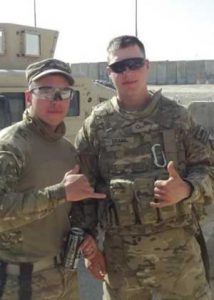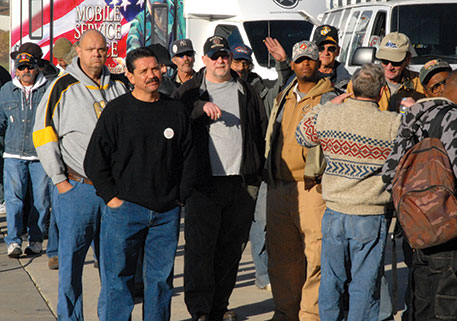Service officer steps up to save fellow veteran’s life, family

Josh Grant was still in high school when he signed his enlistment papers. Two years later, in 2013, the Army engineer turned 20 on a plane headed for Afghanistan. Specifics of the deployment aren’t known, but his family says he returned home a different person.
“He’s never spoken to me about it,” said his father, Curt Grant, “but we found out what happened six months after he got home.”
The young soldier had survived two improvised explosive device attacks during his time overseas. The experiences left him suffering from a traumatic brain injury, post-traumatic stress disorder (PTSD) and severe panic attacks. But because he was not considered a threat to himself or others, doctors at Joint Base Lewis-McChord, Wash., would not immediately treat him.
“He called me during the last couple months of his enlistment, and I could tell he was stressed medically,” Curt explained. “But I couldn’t get a straight answer to what was going on because his providers couldn’t talk to me.”
With little to go on, and fearing for his son’s well-being, Curt paid for his son to receive private care out of his own pocket.
A few months later, Josh was honorably discharged and returned home to Illinois. He tried to adapt to civilian life, but according to his father, his life fell apart around him. He lost his fiancée, whom he had been with for six years, and his struggle with PTSD left him unable to function at his heating and air conditioning job. Even his friends distanced themselves, saying his medication made him paranoid and unable to communicate without slurred and nonsensical speech.
“It was just mind-boggling, all the different medications he was on,” Curt said. “You couldn’t have a coherent conversation with him. He was whacked out of his mind.”
His son became paralyzed by depression, spending most days in bed and only retreating to the garage to draw, write or smoke—a habit he became financially reliant upon his parents to support since he no longer had a job.
Even more distressing was the fact that Josh was aware of all the changes he was going through. During one incident, he walked inside the house, sat down, stared blankly at the TV and asked, “I’m going to be OK, right?”
“Here my son is basically asking for help, and I don’t even know how to help him,” said Curt. “We weren’t getting any support from the local VA clinic either.”
The situation became even more alarming when Curt found a loaded gun in his son’s bed, which he took and hid. Josh’s parents then begged him to allow them to take him to a different VA hospital to re-evaluate his medications.
“Once we finally convinced him and got him over there, they told us the local VA had been prescribing him the wrong stuff this whole time,” Curt explained.
He then began writing and calling any organization that would listen to what his son and family were going through.
“I begged anyone who would listen, and the only organization that stepped up with real answers and personal attention was DAV,” Curt said.
It was early 2015 when Curt placed a call to DAV Chapter 17 in Decatur, Ill.
“I heard the stress in his voice,” said chapter service officer Josh Sanders. “He was really worried about his son.”
A former Army infantryman, Sanders spent 10 months at Walter Reed Army Medical Center when he returned home from Iraq in 2004. He knew what it was like to be in that position, and he knew the benefit of veterans service organizations like DAV, which helped him secure his own VA disability rating and Post-9/11 G.I. Bill benefits.
“I heard disbelief in his voice as far as how difficult things were for him with the VA,” Sanders remembered of the first time he spoke to Josh Grant. “You hear a lot of yourself in veterans’ voices, and I heard me in Josh.”
A volunteer chapter service officer since 2006, Sanders secured educational benefits for Josh and initiated a VA disability claim on his behalf. The two communicated regularly throughout the process.
“Josh [Sanders] has a really good demeanor when dealing with veterans that really helps him connect with them,” said John Rodriguez, National Service Officer Assistant Supervisor in DAV’s Chicago office. “That results in more willingness from the veterans and a better claim, which usually results in a more effective decision.”
“You could hear the relief in his voice,” Sanders said of the conversation he and Josh had after receiving Josh’s disability rating. “I’m ecstatic every time I hear one of my veterans gets a positive decision because that financial support frees up the veteran’s mind to focus on other things like themselves or their families.”
The impact was no different for Josh. According to his father, he’s regained his independence and is ready to put the dark episode of his life behind him. He no longer has to rely on his parents for financial support and has since weaned himself off his medication. He hopes to open a small retreat for other veterans on his parents’ pumpkin patch.
Curt credits Sanders for making it happen.
“He’d be a statistic right now if it wasn’t for Josh [Sanders]. He was ready to put a gun to his head,” Curt said. “It wasn’t doctors or a prescription; it was another soldier that got him through it.”
For Sanders, though, it’s all part of his personal process of paying it back.
“I want to give people the help I received when I got out,” he explained. “I want to give back to an organization that did me such a solid. It felt like an obligation at one point, but I don’t feel obliged anymore. I just want to help my fellow veterans.”
“Josh Sanders exemplifies the next generation of DAV service officers who are going to be ready to provide the needed services to veterans of future generations,” Rodriguez said. “He’s a fighter, and he likes to fight for justice for veterans. That’s what keeps him going.”
“Josh Sanders helped my son,” Curt added, fighting back tears. “That young man doesn’t think he did a thing, but he saved my son’s life. He saved my entire family.”





